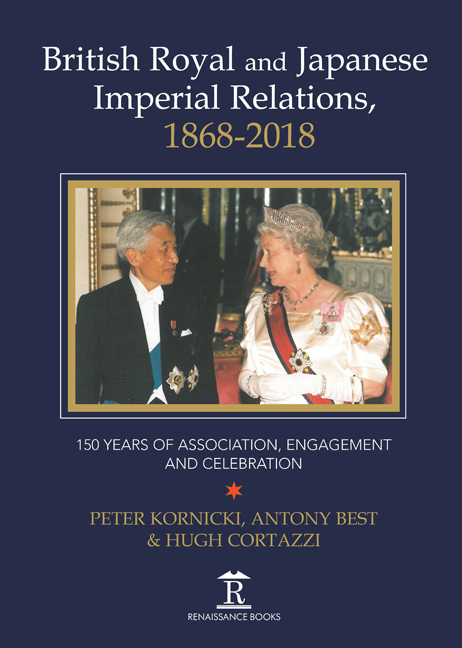 British Royal and Japanese Imperial Relations, 1868-2018
British Royal and Japanese Imperial Relations, 1868-2018 A Royal Alliance: Court Diplomacy 1902—1941
Published online by Cambridge University Press: 30 April 2022
Summary
INTRODUCTION
DURING THE FIRST half of the twentieth century the royal relationship between the British Empire and Impenal Japan played an important part in the link between these two countnes. Indeed, after the collapse of the Romanov, the Hohenzollem and Hapsburg empires in 1917—1918, it would not be too farfetched as to describe it as the most significant royal relationship that remained in existence. To look at why this royal relationship became so important to both powers provides us with a useful way in which to understand the evolution of Anglo-Japanese relations, but it also helps us to comprehend more broadly the special role that royalty continued to play in the twentieth century and the need to take court diplomacy seriously.
As the previous chapter in this volume has demonstrated, the royal relationship between Bntain and Japan had provided some useful contacts in the late nineteenth century but it had never become particularly close. The most important symbol of the distance that remained between the two courts was that it had not been possible to achieve a mutual exchange of decorations between the monarchs. This was because the Bntish government was loath from the mid-1870s onwards to bestow the Order of the Garter on non-Chnstians, while the Japanese were determined not to accept any lower chivalnc honour. It is important, though, to put this problem in context by emphasizing that Japan was far from alone in being treated as an inferior. Its position in 1900 was in fact very similar to that of the other non-Chnstian empires and kingdoms, such as the Ottoman Empire, Persia (Iran), and Siam (Thailand), which had all tried to adapt to European court diplomacy but still found themselves treated as second-rank monarchies. The only exception to this rule was Qmg China which had only avoided similar humiliation because it had done very little to create any ties between the Manchu court and its foreign counterparts.
The patronizing treatment that the Japanese court had received at the hands of Bntain meant that by the 1890s the former had developed a great sensitivity where royal relations were concerned. For example, in 1897 the Japanese had only agreed to send a representative to the queen's diamond jubilee once Bntain had guaranteed that their pnnce would be given the same treatment as European royalty.
- Type
- Chapter
- Information
- British Royal and Japanese Imperial Relations, 1868-2018150 Years of Association, Engagement and Celebration, pp. 75 - 140Publisher: Amsterdam University PressPrint publication year: 2019
